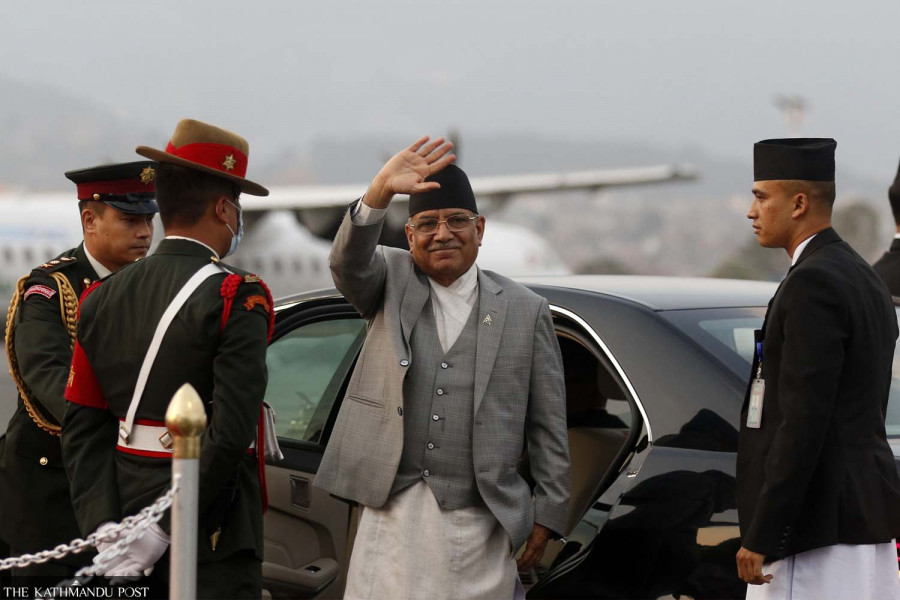National
Prime Minister Pushpa Kamal Dahal plans to visit China in September
Ministries working on the agenda. Foreign Minister Saud could go in July to lay the ground.
Anil Giri
If things go as planned, Prime Minister Pushpa Kamal Dahal will pay an official visit to China in September. It will be his second foreign visit after assuming office in December last year. The Ministry of Foreign Affairs has started the groundwork for the visit.
“I will be visiting China,” Dahal told Kantipur Television in an interview aired on Wednesday. “I don’t want to reveal the visit date, but it’s been fixed,” he said when the interviewer asked if the trip would happen in July or August.
Earlier, Dahal had informed Chinese officials through party leaders that he might go to China at the end of July or in August.
A CPN (Maoist Centre) delegation led by former speaker Agni Prasad Sapkota had gone to China in May and during meetings with several Chinese officials conveyed that Dahal intended to visit China in July-end or in August. And upon his return, Sapkota had hinted that Dahal could visit China in July-end or August.
Dahal also claimed that his upcoming China trip will be highly successful.
“My India visit was highly successful and I can claim that my China visit will also be very successful. After China, I will visit the US to participate in the United Nations General Assembly and there is a possibility of meeting some US leaders as well,” the prime minister said in the TV interview.
Based on Dahal’s statement, one of his aides said if the prime minister visits the US in the third week of September to participate in the UN General Assembly, then his China visit would take place the same month, before or after the US visit.
The general debate of the UN General Assembly in New York begins from September 23 and prior to that, the UN is organising the 2023 Sustainable Development Goal Summit on September 18 and 19 where several heads of state and government will gather, according to the UN website.
“The prime minister’s visit to China will probably take place prior to the high-level engagements at the UN,” the aide said. “So the China visit will most likely happen in the first half of September.”
Foreign Minister Saud also confirmed to the Post that the prime minister is visiting China in September.
“We have received the related communication, but as a high-level government official, I cannot reveal the dates to the media,” said Saud. “Once we agree on a mutually convenient date, both sides will announce the visit.”
With this, the foreign ministry, in order to set the agenda for the visit, has started preliminary work that includes studying the archives and past bilateral communications, understandings, and agreements, among others.
Diplomatic sources, meanwhile, said the prime minister’s visit to China had earlier been planned for July-end or August, but was postponed to September “due to some reasons”.
As per the tradition, plans are afoot to schedule a visit of Foreign Minister Saud to the northern neighbour prior to Prime Minister Dahal’s visit. There, Saud will make preparations and set the agenda for Dahal’s visit.
“We will try to schedule our foreign minister’s Beijing trip sometime in July,” Nepali Ambassador to China Bishnu Pukar Shrestha, who is currently in Kathmandu, told the Post.
“But we are unsure if Chinese Foreign Minister Qin Gang, who is also the state councillor, will come on a return visit to Kathmandu,” the ambassador said.
During the Kantipur Television interview, the prime minister also touched on the geopolitical shifts happening right round the around, particularly the Russia-Ukraine war.
“The world seems to be polarising with the emergence of the new situation following the Russia-Ukraine war. Several questions are being raised about the stability and predictability of the world order. And due to our location and geopolitical sensitivity, we have to remain cautious,” Dahal told Kantipur Television.
“We suffer from the highs and lows in relations between India and China, as well as the fluctuations in relations between the US and China,” said Dahal. “Keeping all these factors in mind, we should conduct our internal politics and international relations—by keeping national interest at the core.”




 14.12°C Kathmandu
14.12°C Kathmandu














